Euthymedia or Euthydemia was the ancient city of Sagala belonging to the Bactrian Dynasty, now located in modern-day Sialkot, Pakistan. The British classical scholar William Woodthorpe Tarn, suggested that "Euthydemia" was never assigned as a new name for ancient Sagala, and that the name was actually Euthymedeia. The altered name was suggested to have been a 1738 alteration made by historian T Beyer. The city was mentioned by Ptolemy in his 1st century BCE work, Geography.
Sagala, Sakala, or Sangala was a city in ancient India, which was the predecessor of the modern city of Sialkot that is located in what is now Pakistan's northern Punjab province. The city was the capital of the Madra Kingdom and it was razed in 326 BC during the Indian campaign of Alexander the Great. In the 2nd century BC, Sagala was made capital of the Indo-Greek kingdom by Menander I. Menander embraced Buddhism after extensive debating with a Buddhist monk, as recorded in the Buddhist text Milinda Panha. Sagala became a major centre for Buddhism under his reign, and prospered as a major trading centre.

The Indo-Greek Kingdom, or Graeco-Indian Kingdom, also known historically as the Yavana Kingdom (Yavanarajya), was a Hellenistic-era Greek kingdom covering various parts of modern-day Afghanistan, Pakistan and northwestern India. This kingdom was in existence from c. 200 BC to the beginning of the common era.
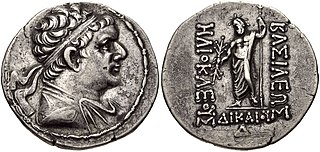
Heliocles I was a Greco-Bactrian king, brother and successor of Eucratides the Great, and considered the last Greek king to reign over the Bactrian country. His reign was a troubled one; according to Roman historian Justin, Eucratides was murdered crossing the Hindu Kush by one of his sons, although this is highly disputed and Justin fails to name the perpetrator. Eucratides’ death led to instability, even civil war, which caused the Indian parts of the empire to be lost to Indo-Greek king Menander I and southern Bactria to be lost to the Yuezhi.
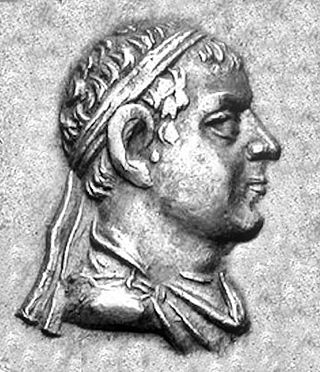
Nicias was an Indo-Greek king who ruled in the Paropamisade. Most of his relatively few coins have been found in northern Pakistan, indicating that he ruled a smaller principate around the lower Kabul valley. He was possibly a relative of Menander I.
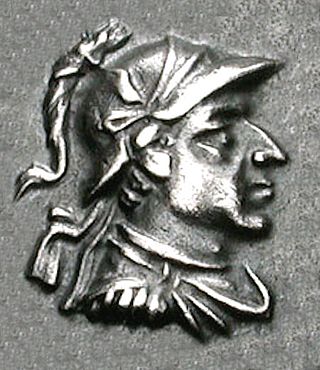
Antialcidas Nikephoros was a king of the Indo-Greek Kingdom, who reigned from his capital at Taxila. Bopearachchi has suggested that he ruled from ca. 115 to 95 BCE in the western parts of the Indo-Greek realms, whereas R. C. Senior places him around 130 to 120 BCE and also in eastern Punjab. Senior does however believe that he ruled in tandem with King Lysias.
Vac is a Vedic goddess who is a personified form of divine speech. She enters into the inspired poets and visionaries, gives expression and energy to those she loves; she is called the "mother of the Vedas" and consort of Prajapati, the Vedic embodiment of mind. She is also associated with Indra in Aitareya Aranyaka. Elsewhere, such as in the Padma Purana, she is stated to be the wife of Vision (Kashyapa), the mother of Emotions, and the friend of Musicians (Gandharva).
Pyrrhonism is an Ancient Greek school of philosophical skepticism which rejects dogma and advocates the suspension of judgement over the truth of all beliefs. It was founded by Aenesidemus in the first century BCE, and said to have been inspired by the teachings of Pyrrho and Timon of Phlius in the fourth century BCE. Pyrrhonism is best known today through the surviving works of Sextus Empiricus, writing in the late second century or early third century CE. The publication of Sextus' works in the Renaissance ignited a revival of interest in Skepticism and played a major role in Reformation thought and the development of early modern philosophy.
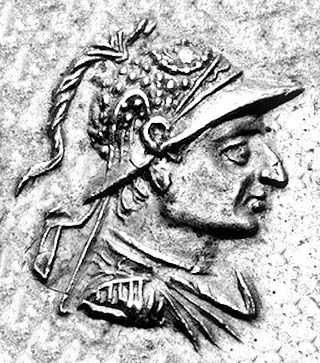
Archebius Dikaios Nikephoros was an Indo-Greek king who ruled in the area of Taxila. Osmund Bopearachchi dates him to c. 90–80 BCE, and R. C. Senior to about the same period. He was probably one of the last Indo-Greek kings before the Saka king Maues conquered Taxila, and a contemporary of Hermaeus in the west. He may have been a relative of Heliokles II, who used a similar reverse and also the title Dikaios.

Zeionises was an Indo-Scythian satrap.

Eucratides II was a Greco-Bactrian king of the 2nd century BC who was a successor, and probably a son, of Eucratides I. It seems likely that Eucratides II ruled for a relatively short time after the murder of his namesake, until he was dethroned in the dynastic civil war caused by the same murder, since Justin reports:
The development of Indian logic dates back to the anviksiki of Medhatithi Gautama ; the Sanskrit grammar rules of Pāṇini ; the Vaisheshika school's analysis of atomism ; the analysis of inference by Gotama, founder of the Nyaya school of Hindu philosophy; and the tetralemma of Nagarjuna.

Several instances of interaction between Buddhism and the Roman world are documented by Classical and early Christian writers. Textual sources in Tamil language, moreover, suggest the presence of Buddhism among some Roman citizens in the 2nd century AD.
Atomism is a natural philosophy proposing that the physical universe is composed of fundamental indivisible components known as atoms.
The Pauliṣa Siddhānta refers to multiple Indian astronomical treatises, at least one of which is based on a Western source. "Siddhānta" literally means "doctrine" or "tradition".
The Romaka Siddhanta, literally "The Doctrine of the Romans", is one of the five siddhantas mentioned in Varahamihira's Panchasiddhantika which is an Indian astronomical treatise.
Thomas McEvilley was an American art critic, poet, novelist, and scholar. He was a Distinguished Lecturer in Art History at Rice University and founder and former chair of the Department of Art Criticism and Writing at the School of Visual Arts in New York City.
The 'neither one nor many' argument is an argument employed by different philosophers and spiritual traditions for various reasons. The argument and its permutations and antecedents, particularly the "problem of the One and the Many" as charted by McEvilley has an ancient pedigree in the lineages of both Indian philosophy and Greek philosophy. McEvilley (2002) also provides arguments inferring the mutual influence and mutual iteration of the ancient Indian and Greek philosophical traditions. The argument is a factor in the algorithmic function of the Catuskoti. In its Buddhist employ, the argument is one of a suite of arguments within the purview of Pramana and Indian logic to demonstrate and test various doctrines. Different authorities and sources provide different enumerations of these said arguments; Khenpo Yonten Gyamtso lists them thus:

Buddhism has existed in Greece since antiquity. Today, there is a sizable Buddhist community in Greece, comprising immigrants and native Greek converts. Buddhism has influenced Greek literary tradition to some extent, as evident in the works of Nikos Kazantzakis.
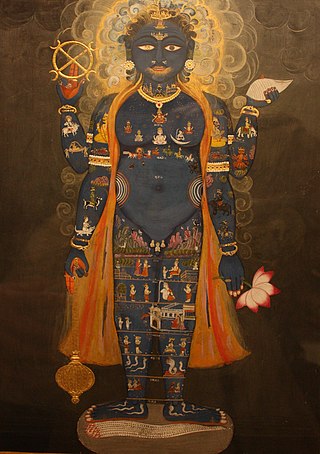
Macranthropy is the allegorical portrayal of the universe as a giant anthropomorphic body. The various components of the universe are assigned to corresponding body parts.










